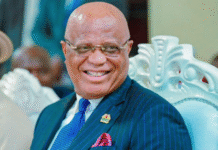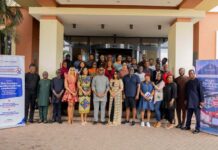Adekeye Adebajo
Former French president, François Mitterrand (1981-1995), had prophetically noted in 1957: “Without Africa, France will no longer have a history in the twenty-first century.” From the 17th to the 19th centuries, French slave traders operating out of the ports of Nantes, Bordeaux, La Rochelle, and Le Havre, ferried 1,381,000 African slaves across the Atlantic to work on sugar plantations in Saint-Domingue (Haiti), Guadeloupe, Martinique, and French Guiana.
Advocating a racist mission civilisatrice (civilising mission), Paris also pursued over a century of colonial rule in Africa, resulting in the deaths of one million Algerians and the massacre of 86,000 Madagascans.
For the past six decades, France’s relations with its former African colonies have smacked of a paternalistic neo-colonialism. An intricate network of political, military, economic, and cultural ties – known as Françafrique – have been used to promote what French leaders regarded as a politique de grandeur. Gallic policy in Africa was built on personal ties which cemented the dependence of its former colonies on the Mother Country.
All French presidents from Charles de Gaulle (1959-1969) to Emmauel Macron (since 2017) have continued this neo-colonial policy, using the votes of 22 francophone African states to bolster support in international organisations. It is this sordid system of Françafrique that events in Niger, Mali, Burkina Faso, and Guinea are now exposing for its moral bankruptcy.
Folie de Grandeur
French coopérants have historically provided technical assistance to African ministries, sometimes overruling African ministers. In a clearly corrupt system, African leaders funded the political campaigns of French political parties.
For nearly three decades, highly personalised relations with African leaders were entrusted to Jacques Foccart, an éminence grise and master of the secret du roi, who established his infamous réseaux africains: clandestine networks of spooks and soldiers, murderers and mercenaries, and priests and policemen.
Several francophone African leaders subserviently referred to French president, de Gaulle, as “Papa”. In a 1958 referendum, the French leader offered his African “children” a choice between joining a Communauté Française in which Paris would still retain control over foreign and defence policy, or independence, in which France would sever all financial and economic ties. Only enfant terrible, Guinea’s Sékou Touré, chose freedom over neo-colonialism.
A vengeful de Gaulle cut off all economic aid; expelled Guinea from the franc zone; and carted telephones, archives, and civil service files back to France. The Gallic mission civilisatrice was largely used to enslave the vast majority of colonial subjects, while a tiny African elite played at being black Frenchmen.
Though all francophone African countries were eventually granted nominal independence by 1963, all signed economic and military pacts which gave France continued control over their sovereign affairs. As part of projecting its cultural hegemony; from 1969, Paris sponsored a biennial African film festival in Burkina Faso (Festival Panafricain du Cinéma et de la Télévision de Ouagadougou, FESPACO).
During the Cold War, Washington considered France’s role to be useful in keeping the Soviet bear out of Africa. Paris had military bases in Djibouti, Central African Republic (CAR), Côte d’ Ivoire, Gabon, and Senegal. For six decades, the French gendarme acted like a pyromaniac fireman intervening over 50 times in Africa, while shuffling regimes around like a deranged poker player. As former Gallic foreign minister, Louis de Guiringaud (1976-1978), arrogantly boasted: “Africa is the only continent … where [France] can still, with 300 men, change the course of history.”
In the most extraordinary incident, Paris flew David Dacko to CAR to replace its leader, Jean-Bédel Bokassa, in 1979. Bokassa had squandered a third of his country’s national income on staging a grandiloquent Napoleonic coronation in 1977. His killing of schoolchildren and the revelation of a gift of diamonds to President Giscard d’Estaing (1974-1981) finally proved too embarrassing to France. Giscard thus toppled a hunting companion he had once described as France’s best friend in Africa.
The franc zone saw 13 francophone African states tying their CFA franc to the French franc, with Paris effectively controlling the zone’s central banks, and the French treasury holding all of their foreign reserves. Some 80,000 French expatriates flooded into Africa pour faire le CFA.
French industrial giants like CFAO, SCOA, Elf Aquitaine, and Bouygues continued to monopolise markets they had cornered during the colonial era. France’s “cooperation agreements” gave it priority access to Africa’s strategic minerals: Gabon and Niger provided Paris with 100% of its uranium, Guinea 90% of its bauxite, and Cameroon, Congo-Brazzaville, and Gabon 70% of its oil.
Paristroika
With the end of the Cold War, the idea of an exclusive Gallic chasse gardée (private hunting-ground) in Africa came under increasing challenge. French reversals in Rwanda and Zaire left its Africa policy in disarray: it trained and armed Rwandan génocidaires, and supported a sinking Mobutu Sese Seko long after he had passed his sell-by date. By 1990, pro-democracy demonstrations in Benin, Côte d’Ivoire, Gabon, and Niger forced many francophone states to adopt various forms of multi-party democracy.
At the Franco-African summit in La Baule in 1990, Mitterrand announced a policy dubbed “Paristroika”: linking continued aid to democratic reforms. But France continued to apply democracy inconsistently, sanctioning sham elections in Burkina Faso, Chad, Côte d’Ivoire, Cameroon, Gabon, Niger, and Togo; and resuming aid to fraudulent regimes.




























































